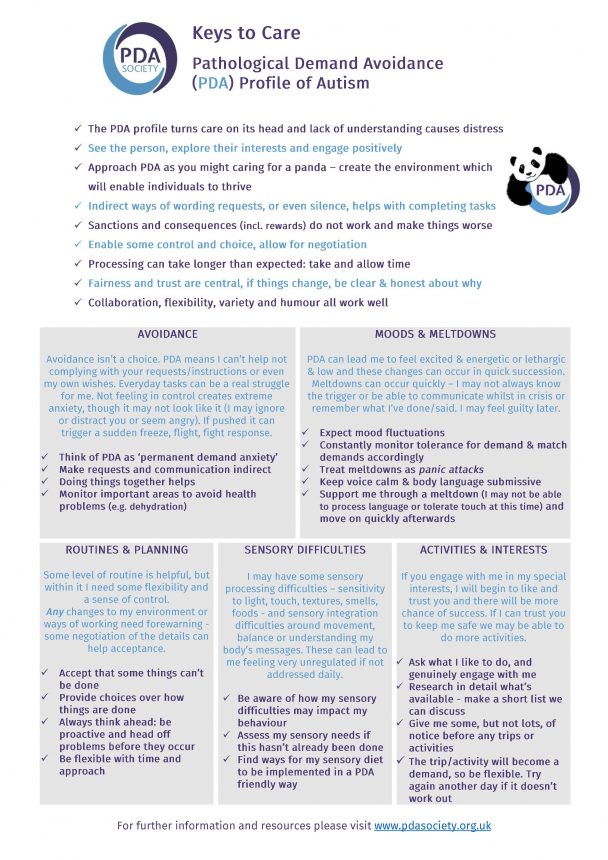Today is World Autism Awareness Day. As a parent of an autistic child, this is of course very significant to me. Squiggle actually has a subtype of autism called Pathological Demand Avoidance (PDA) which is something I have written about before and more information can be found on the PDA Society website. There are significant differences between PDA and other types of autism, and in many ways PDA is still very much the lesser know cousin. Far more awareness of this particular subtype is needed, so it is tempting to focus my post on that. However, I am going to share this useful one page snapshot and move on, because I have too many other thoughts for this post already!

So, my thoughts about Autism Awareness Day…
Awareness is not enough
Awareness just means knowing something. This is a start of course, but the word bothers me a little because awareness does not in itself make any any real difference to autistic people or their families. On this note, I am pleased to see the #AutismAcceptance and #ActuallyAutistic gaining more popularity across social media. Please take the time to listen to people who are autistic, and those who live with them. Trust me, I was an SEND teacher and SENCo before I became a parent, and I thought that made me abit of an expert; I look back and cringe now at what little I really knew! What is really needed goes beyond just awareness; it is the need for true understanding, acceptance and support.
Which brings me onto my next thought…
Autistic people and their families need the right kind of support
Whether it is a passerby in the street, a member of the local community, or a professional involved, autistic people and their families need the right kind of support. What is helpful to one person, might be harmful to another. Want to know the most effective way to help? Ask! And listen to the answer. (Without taking it personally, or thinking you know better!)
For example, if a child is having an autistic meltdown, it might be helpful to assist in getting them to a quieter spot. On the otherhand, the added involvement – especially from a stranger – might make things worse; giving the child and carer extra space to deal with it might be more helpful. Listening, understanding needs differ, and responding accordingly benefits everyone.
Stop speculating and assuming
Following on from this, please avoid assuming. As a parent of an autistic child, I am aware of the challenges my daughter faces and what works – and doesn’t. It might seem that parenting strategies aren’t being implimented or that the child just needs more discipline (SEND parents hear this alot!) but the reality is far more complex. Please don’t assume you know better from small glimpses you see, or limited experiences, or speculate on the reasons for behaviours you see. The only real expert is the autistic person themselves, and those who live with them.
As for speculating; I see alot of discussion surrounding the causes of autism. This is unhelpful in my opinion. What does this actually achieve? Nothing. So let’s focus on how to support autistic people instead.
Addressing stereotypes and misconceptions… and unhelpful terminology
There are still alot of stereotypes and misconceptions floating around. I am not going to go into them in this post, but I ask that people take a step back and question any generalisations. Also, some of the terminology can be unhelpful and add to this further. The terms high and low functioning, mild and severe for example. My daughter is highly verbal with good understanding. However, she also needs alot of support in everyday life and finds many simple things extremely challenging. It is far more useful to get to know individuals and just accept them as they are than to think you understand them based on someone else entirely.
Different is not less
Just because someone’s brain is wired differently, it does not make them ‘less’. Many people say autistic people lack empathy (which is not true, by the way!) yet they expect them to fit into their own neurotypical world that does not even try accomodate their needs. It would be a much nicer world if we tried harder to put ourselves in other peoples’ shoes and show a little more understanding. Let’s celebrate, and support, our differences. I loved this sign from London Underground about changing the conversation…
Picadilly Station, I salute you#AutismAwarenessWeek #AutismAwarenessMonth #AutismAcceptance #GoingforGold #lightitupgold #ActuallyAutistic #autism@NEAutismSociety @AutismDurpol @thinkingautism pic.twitter.com/2F6SomfpTD
— TheAutisticAdvocate (@KieranRose7) April 1, 2019
Girls can be autistic too!
Last but not least, girls tend to mask better (this is not a good thing! It can massively impact self esteem and mental health) and present differently to boys. This fact is only just gaining awareness in more recent years, and girls are frequently undiagnosed or misdiagnosed because of this. It is really important to understand the differences between genders within the autistic community too.
I am going to end this (now very long) post with a YouTube video made by Carrie Grant, which is brilliant, so please watch….
Thanks for taking the time to read. And remember; sharing is caring!
